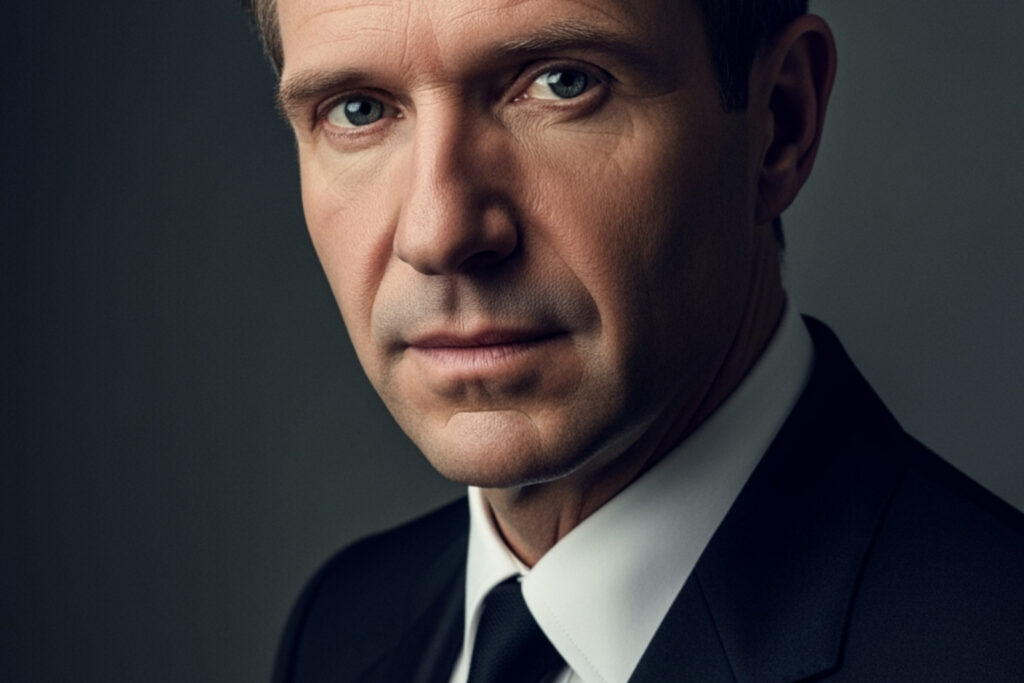Why Ralph Fiennes Remains One of Cinema’s Most Compelling Actors
Ralph Fiennes is an English actor whose career spans over three decades, delivering some of the most memorable performances in modern cinema. From his chilling portrayal of Nazi commandant Amon Göth in Schindler’s List to his iconic turn as the villainous Lord Voldemort in the Harry Potter series, Fiennes has consistently demonstrated remarkable range and depth.
Quick Facts About Ralph Fiennes:
- Born: December 22, 1962, in Ipswich, Suffolk, England
- Notable Roles: Lord Voldemort (Harry Potter), Amon Göth (Schindler’s List), M (James Bond)
- Awards: Tony Award winner, BAFTA Award winner, two Academy Award nominations
- Career Span: 1985-present with 123+ film and TV credits
- Also Known For: Directing (Coriolanus, The White Crow), stage work, UNICEF ambassadorship
What makes Fiennes truly exceptional is his ability to disappear into vastly different characters. Whether he’s playing a sophisticated hotel concierge in The Grand Budapest Hotel or a menacing chef in the recent culinary thriller The Menu, his performances are always compelling and utterly convincing.
His theatrical training at the Royal Academy of Dramatic Art and work with the Royal Shakespeare Company provided the foundation for a career that seamlessly blends blockbuster entertainment with serious dramatic work. As one critic noted, Fiennes possesses a “rich, mellifluous voice” and consistently chooses roles that challenge both himself and audiences.
For food and travel enthusiasts, Fiennes’ recent role as the obsessive Chef Julian Slowik in The Menu offers a darkly satirical look at fine dining culture that will resonate with anyone who’s experienced the theatrical world of high-end restaurants.
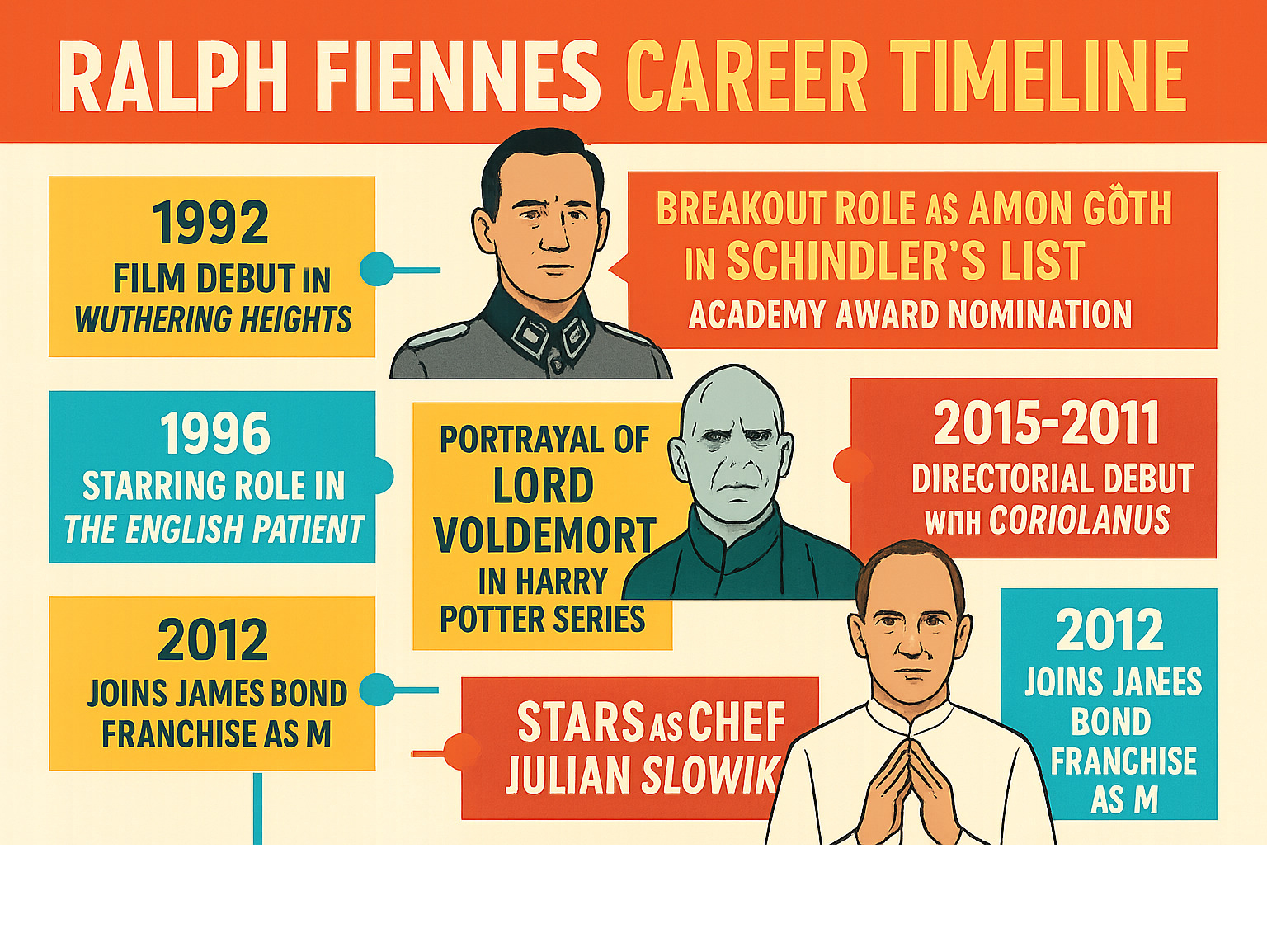
1. His Unforgettable, Award-Winning Performances
Ralph Fiennes has built his career on performances that don’t just entertain—they haunt you long after the credits roll. His ability to transform completely for each role has earned him some of the most prestigious awards in the industry and cemented his reputation as one of cinema’s finest actors.
His breakthrough came with one of the most chilling performances ever captured on film. As Nazi commandant Amon Goeth in Steven Spielberg’s Schindler’s List, Fiennes created a villain so terrifyingly ordinary that audiences couldn’t look away. What made his portrayal so unsettling was how he showed the banality of evil—this wasn’t a cartoonish monster, but a man who could shoot prisoners from his balcony and then calmly eat breakfast.
The role demanded everything from Fiennes. He gained significant weight to match the real Goeth’s appearance, then shed it afterward, showing the physical commitment that would become his trademark. His work earned him an Academy Award nomination for Best Supporting Actor and a BAFTA Award for Best Actor in a Supporting Role—recognition that launched him into Hollywood’s top tier.
Just three years later, Ralph Fiennes proved his range with a completely different kind of intensity. As Count Almásy in The English Patient, he embodied a doomed romantic hero consumed by passion and regret. This sweeping desert epic showcased his ability to carry a complex love story, earning him a second Academy Award nomination—this time for Best Actor.
But perhaps one of his most delightful surprises came decades later in Wes Anderson’s The Grand Budapest Hotel. As the impeccably mannered M. Gustave, Fiennes revealed a gift for rapid-fire comedy that few had seen before. His performance as the fastidious concierge—complete with cheerful profanity and unwavering dedication to luxury service—earned critical acclaim and showed audiences an entirely new side of his talent.
Throughout his career, Ralph Fiennes has shared the screen with cinema’s greatest talents, including collaborations with actors featured in Cate Blanchett Movies, always holding his own with remarkable depth and nuance. His consistent excellence led BAFTA to honor him with a special Ralph Fiennes | A Life In Pictures celebration, recognizing decades of extraordinary work.
What sets these performances apart isn’t just the awards—though the Academy Award nominations and BAFTA Award certainly speak to his excellence. It’s how each role feels completely authentic, as if Fiennes has disappeared entirely and left only the character behind.
2. His Chilling Portrayals of Iconic Villains
There’s something deeply unsettling about watching Ralph Fiennes play a villain. He doesn’t just portray evil characters – he inhabits them with such chilling authenticity that you can’t look away. His ability to find the humanity in monsters, or conversely, the monstrosity in humans, has created some of cinema’s most memorable antagonists.
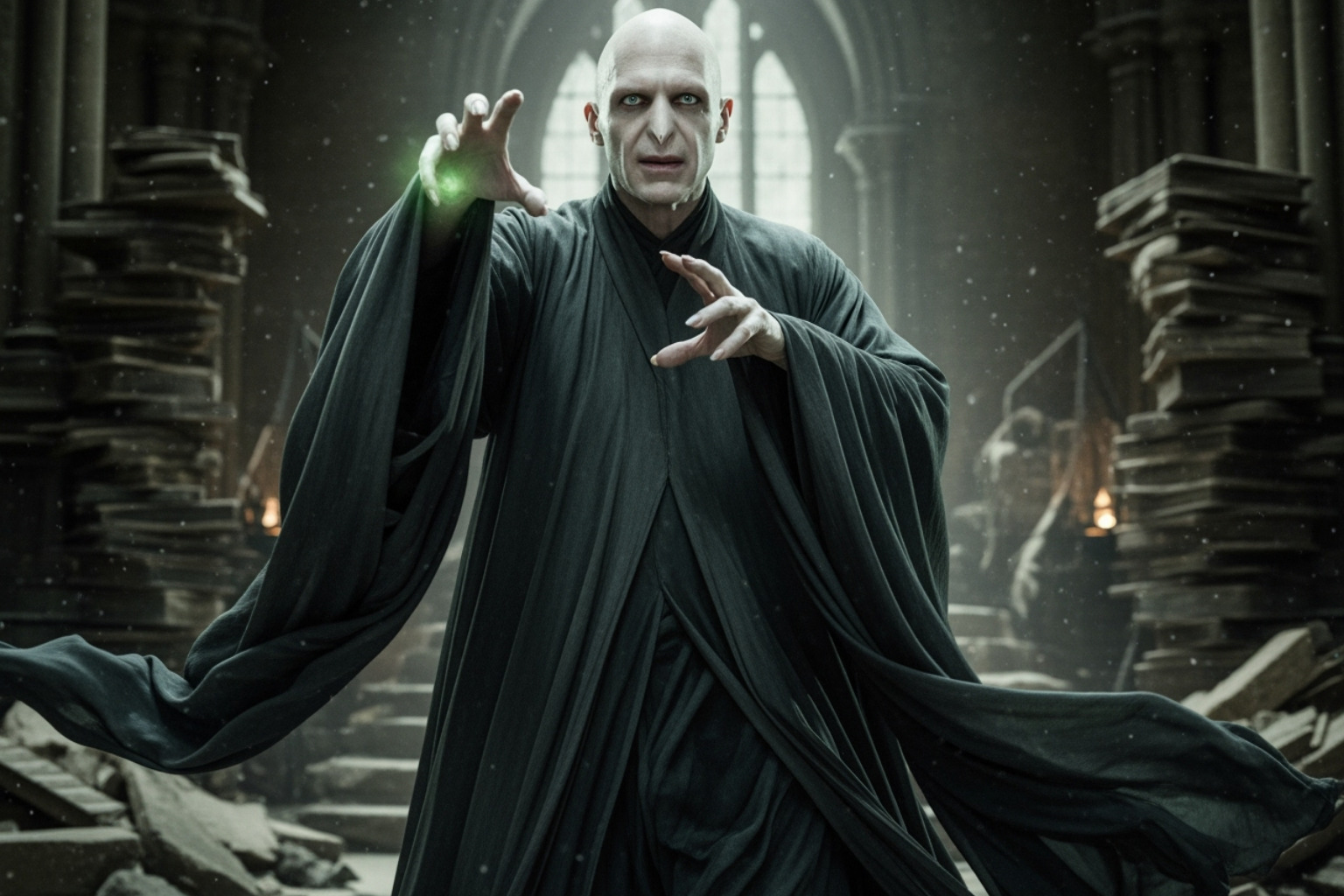
Perhaps no role showcases this better than his portrayal of Lord Voldemort in the Harry Potter series. When Ralph Fiennes first appeared as He-Who-Must-Not-Be-Named in Harry Potter and the Goblet of Fire, audiences worldwide felt a collective shiver. His serpentine delivery and hollow, menacing presence brought J.K. Rowling’s Dark Lord to terrifying life.
What made his Voldemort so effective wasn’t just the makeup and special effects – it was Fiennes’ understanding of the character’s twisted psychology. He described his approach as “instinctive, visceral, physical,” and it showed. Children on set were genuinely frightened of him in costume, which he took as confirmation that he’d nailed the role. There’s even a delightful family connection here: his nephew, Hero Fiennes Tiffin, played the young Tom Riddle in Harry Potter and the Half-Blood Prince.
But Fiennes had already proven his mastery of cinematic evil years earlier with Amon Goeth in Schindler’s List. This performance was so powerfully disturbing that the American Film Institute ranked Goeth as #15 on their list of the top 50 film villains. The role profoundly affected Fiennes personally, forcing him to confront what he called the “banality and everydayness of evil.”
His talent for complex villains continued with Francis Dolarhyde, the “Tooth Fairy” killer in Red Dragon. Critics praised his “scarily good” performance, noting how he brought both sympathy and terror to this psychologically damaged character. It’s this nuanced approach that sets him apart from other actors who might play villains as one-dimensional monsters.
What’s remarkable about Ralph Fiennes is how he finds these dark corners of human nature and explores them fearlessly. Like other masters of complex characters such as Javier Bardem, Fiennes understands that the most terrifying villains are those who feel real – and that’s exactly what makes his performances so unforgettable.
3. His Deep Roots in Classical Theatre
There’s something truly special about watching Ralph Fiennes on screen that sets him apart from many of his contemporaries. That commanding presence, that perfectly pitched voice, and his ability to make even the most complex dialogue feel natural? It all traces back to his deep roots in classical theatre.
Ralph Fiennes didn’t just stumble into acting – he earned his craft the old-fashioned way. After graduating from the prestigious Royal Academy of Dramatic Art in 1985, he dove headfirst into classical theatre. His early years with the Royal National Theatre and the Royal Shakespeare Company weren’t just job opportunities; they were his acting boot camp.
It was during his time with the Royal Shakespeare Company that Fiennes truly found his voice – quite literally. Working with Shakespeare’s complex verse and demanding characters taught him to use that rich, mellifluous voice we all recognize today. Whether he’s delivering a menacing monologue as Voldemort or charming audiences in The Grand Budapest Hotel, you can hear the classical training in every syllable.
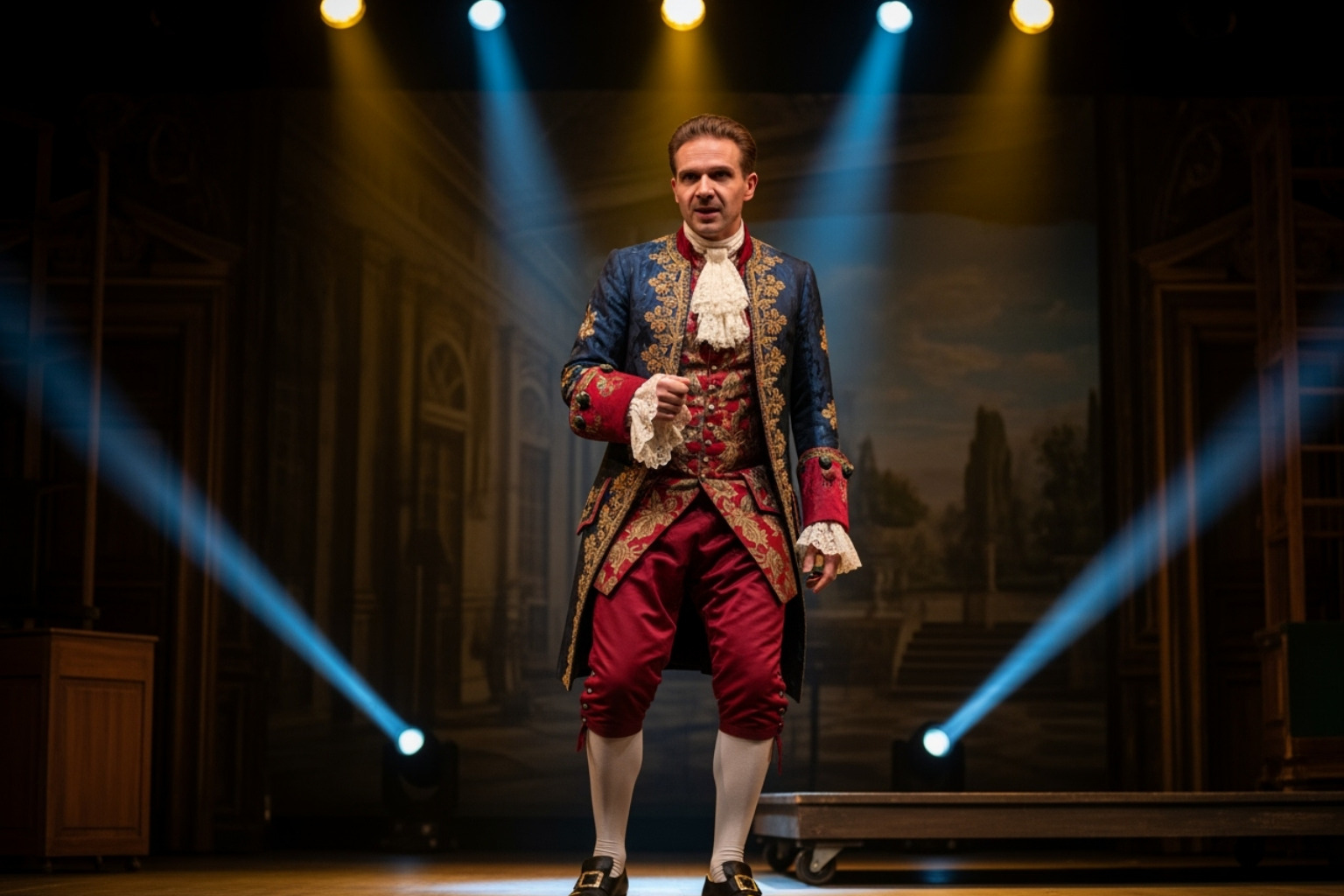
His stage work reached its peak with his unforgettable portrayal of Hamlet. When the production transferred to Broadway in 1995, Fiennes took home a Tony Award for Best Actor in a Play. It’s one thing to play Hamlet well, but it’s another entirely to make Shakespeare’s most famous character feel fresh and immediate for modern audiences.
But Ralph Fiennes never abandoned his theatrical roots, even as his film career soared. He continued tackling Shakespeare, taking on roles like Coriolanus and Macbeth with the same intensity he brings to his screen work. His recent performance as Robert Moses in David Hare’s Straight Line Crazy showed he’s still committed to live theatre, with tickets selling out quickly when the production hit New York.
What makes his theatrical background so valuable isn’t just the technique – it’s the discipline. Classical theatre demands precision, emotional honesty, and the ability to hold an audience’s attention with nothing but your voice and presence. These skills translate beautifully to film, giving Fiennes that rare quality of making every role feel both grounded and liftd.
That’s why whether he’s playing a Shakespearean king or a modern-day chef, Ralph Fiennes brings the same level of commitment and craft. His theatre training didn’t just teach him how to act – it taught him how to disappear completely into every character he plays.
4. The Incredible Versatility of Ralph Fiennes
What truly sets Ralph Fiennes apart in Hollywood is his remarkable ability to move effortlessly between vastly different worlds of cinema. One moment he’s terrorizing audiences as a dark wizard, the next he’s charming them as a quirky hotel concierge. This incredible range has made him one of the most respected actors of his generation.
Take his journey into blockbuster franchises, for instance. After establishing himself as the ultimate villain Lord Voldemort in the Harry Potter series, Ralph Fiennes made a surprising transition into another beloved franchise. He stepped into the polished shoes of M, the head of MI6, in the James Bond films, starting with Skyfall (2012).
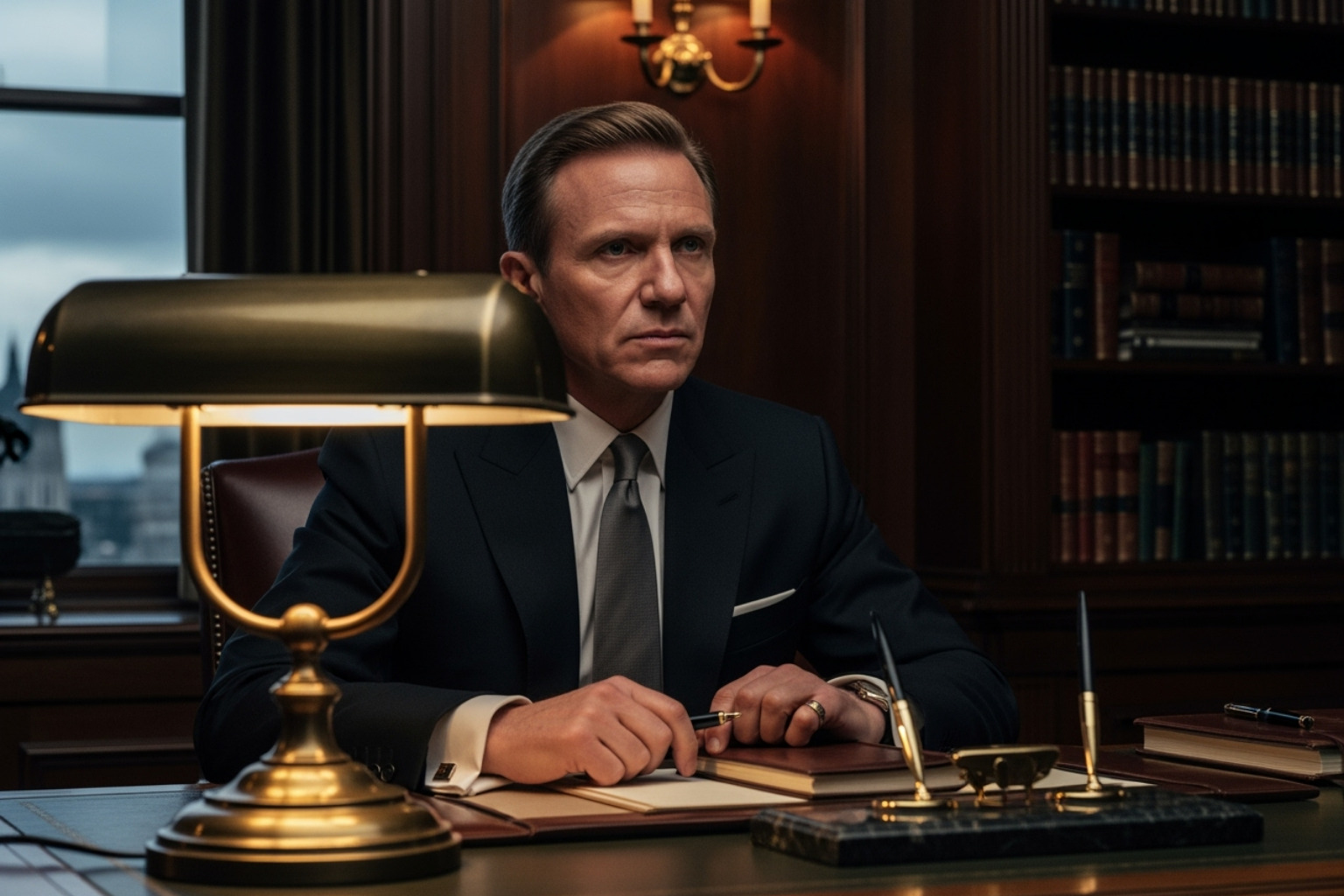
Taking over from the formidable Dame Judi Dench was no small feat, but Fiennes brought his own gravitas to the role. He continued as M through Spectre (2015) and No Time to Die (2021), proving he could handle the sophisticated demands of the spy thriller genre just as masterfully as he wielded a magic wand.
But here’s where Ralph Fiennes really shines – his commitment to balancing these big-budget spectacles with intimate, character-driven stories. While many actors get trapped in franchise work, he consistently returns to independent films that showcase his dramatic depth.
His performance in The Constant Gardener (2005) demonstrated his ability to portray quiet grief and determination. In The Dig (2021), he brought understated elegance to the role of an archaeologist uncovering ancient treasures. These films remind us why critics consistently praise his thoughtful approach to character development.
Perhaps his most delightful surprise came with Wes Anderson‘s The Grand Budapest Hotel, where he transformed into the flamboyantly proper concierge M. Gustave. His rapid-fire delivery of both neat compliments and colorful profanity created one of cinema’s most memorable characters. It’s this willingness to accept the absurd that makes him such a joy to watch.
Ralph Fiennes has also shown great collaborative spirit, working alongside talented actors like Kerry Condon in various projects. He seems to choose roles not for their commercial appeal, but for the creative challenges they present.
This balancing act isn’t always easy in Hollywood, where actors often get pigeonholed into specific types of roles. Yet Ralph Fiennes continues to surprise us, moving from commanding a secret service organization to playing vulnerable characters in quiet dramas. It’s this fearless approach to his craft that keeps audiences eagerly anticipating his next change.
5. His Talent Extends Behind the Camera
Ralph Fiennes has always been drawn to storytelling from every angle, and his move into directing feels like a natural evolution of his artistic journey. What started as a deep appreciation for the craft of filmmaking has blossomed into a second career that’s just as thoughtful and compelling as his acting work.
His directorial debut came with Coriolanus in 2011, and what a debut it was! Taking on Shakespeare’s complex political tragedy, Fiennes didn’t just direct – he also starred as the titular character. It was an ambitious first step that showed his willingness to tackle challenging material. The film transported the ancient Roman story to a modern setting, proving that Ralph Fiennes understood how to make classical stories feel fresh and relevant.
The success of Coriolanus opened doors for more directorial projects. The Invisible Woman (2013) saw him exploring the secret romance between Charles Dickens and actress Ellen Ternan, while The White Crow (2018) told the fascinating story of ballet dancer Rudolf Nureyev’s defection from the Soviet Union. For this film, Fiennes even learned Russian to play the poet Alexander Pushkin, showing the same dedication to authenticity that marks all his work.
Ralph Fiennes’ Directorial Works:
- Coriolanus (2011)
- The Invisible Woman (2013)
- The White Crow (2018)
- The Guide (short film, 2020)
What’s particularly impressive is how his directing work has been recognized internationally. His filming in Serbia for both Coriolanus and The White Crow was so appreciated that he received honorary Serbian citizenship in 2017. That’s quite an honor for someone who started as a British stage actor!
Beyond the director’s chair, Ralph Fiennes has also taken on producer roles, giving him even more control over the creative process. With six producer credits to his name, he’s clearly someone who wants to be involved in shaping stories from start to finish.
This behind-the-camera work reveals another layer of Fiennes’ artistic personality – his desire to tell meaningful stories that connect with audiences on a deeper level. Whether he’s crafting visual narratives or exploring the complexities of human relationships, his approach remains consistent with the thoughtful, immersive style that has made him such a compelling screen presence. For those interested in the art of visual storytelling and creative processes, you might find insights into similar crafts in our guide on food and travel photography.
6. His Meticulous and Immersive Acting Process
When you watch Ralph Fiennes on screen, you’re witnessing the result of an incredibly thorough and immersive acting process. He doesn’t just memorize lines and hit his marks – he completely transforms himself into each character, often going to extraordinary lengths to achieve authenticity.
His dedication to physical change is legendary. For his chilling portrayal of Amon Göth in Schindler’s List, Ralph Fiennes gained significant weight to match the real Nazi commandant’s appearance, then methodically shed those pounds after filming wrapped. This wasn’t just about looking the part – it was about understanding how the character’s physicality affected his psychology and presence.
The commitment goes far beyond physical changes. When preparing for The White Crow, where he played Alexander Pushkin, Fiennes took on the challenge of learning Russian. This linguistic dedication shows his belief that authenticity in every detail creates a more truthful performance. It’s this kind of preparation that separates good actors from truly great ones.
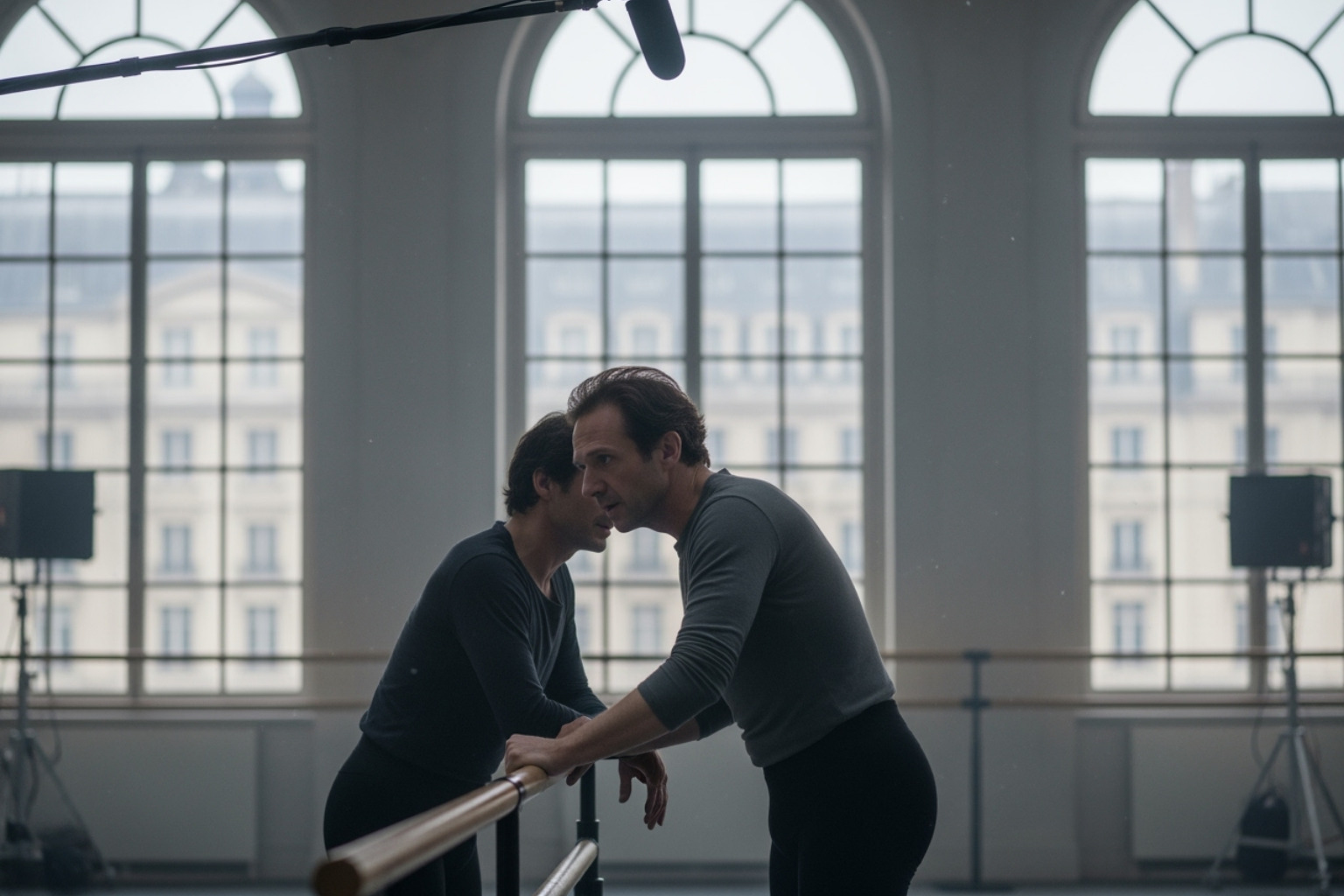
Perhaps the most telling example of his immersive approach came during the filming of Harry Potter and the Goblet of Fire. When children on set were genuinely frightened by his portrayal of Lord Voldemort, Ralph Fiennes knew he had succeeded in capturing the character’s essence. He took their fear as confirmation that he had fully inhabited the role, creating something that felt disturbingly real.
This deep commitment to his craft extends into his personal life through his humanitarian work. Since 1999, he has served as a UNICEF UK ambassador, working on projects across India, Kyrgyzstan, Uganda, and Romania. This global perspective and genuine concern for human suffering undoubtedly informs his ability to portray complex characters with such emotional depth.
Ralph Fiennes has been open about the psychological toll of such intense preparation. He’s spoken about experiencing anxiety and what he calls a fear of “lurking chaos” – perhaps a natural result of regularly exploring the darker corners of human nature. Yet this vulnerability only adds to the authenticity he brings to every role.
Like other dedicated performers such as Thomas Brodie-Sangster, Fiennes understands that great acting requires complete commitment. His meticulous process isn’t just about perfecting a performance – it’s about finding the truth within each character and sharing that truth with audiences in a way that resonates long after the credits roll.
7. His Exciting Recent Roles and Future Projects
Ralph Fiennes continues to captivate audiences with his bold choices and fearless performances. Even decades into his career, he’s still surprising us with roles that showcase new dimensions of his talent. His recent work has been particularly exciting for those of us who love both cinema and the culinary world.
The Culinary Chills of The Menu
If you’re a food lover who enjoys a good psychological thriller, Ralph Fiennes’ performance as Chef Julian Slowik in The Menu (2022) is absolutely unmissable. This dark comedy-horror film gave us one of the most chilling portrayals of a celebrity chef ever put on screen, earning Fiennes a well-deserved Golden Globe nomination for Best Actor in a Motion Picture Musical or Comedy.
Slowik is a world-renowned chef who has lost his passion for cooking, replaced instead by contempt for his wealthy, entitled clientele. Ralph Fiennes brings a terrifying precision to the role, embodying the character’s simmering rage and obsessive control with bone-chilling effectiveness. The film serves as a brilliant satire of fine dining culture, skewering everything from pretentious food descriptions to the cult of celebrity chefs.
For anyone who has experienced the theatrical world of haute cuisine or enjoyed Chef-Led Experiences, The Menu offers a darkly humorous mirror to the industry. The film’s exploration of culinary perfectionism and the pressure-cooker environment of high-end restaurants echoes the dedication we see in renowned chefs like Thomas Keller. Critics described it as “Willy Wonka for Adults,” and Fiennes’ performance is the twisted heart that makes it all work.
What’s Next for Ralph Fiennes?
Looking ahead, Ralph Fiennes shows no signs of slowing down or playing it safe. His upcoming projects continue to demonstrate his willingness to tackle diverse and challenging material.
Conclave promises to be a fascinating thriller where Fiennes plays a cardinal embroiled in the secretive and politically charged process of selecting a new pope. The role seems tailor-made for his ability to convey both gravitas and underlying tension.
He’s also reunited with Wes Anderson for The Wonderful Story of Henry Sugar (2023), where he takes on the dual role of Roald Dahl and The Policeman. This collaboration continues his fruitful relationship with Anderson, following their memorable work together in The Grand Budapest Hotel.
While we’re always excited to see Ralph Fiennes work alongside emerging talents like David Corenswet, what’s most impressive is how he continues to seek out complex characters and compelling narratives. Whether he’s acting or directing, his future aspirations seem focused on storytelling that challenges both himself and audiences.
For those interested in tracking his evolving career and upcoming projects, IMDbPro offers comprehensive details about his professional journey. With his consistent dedication to his craft and his fearless approach to character work, we can’t wait to see what Ralph Fiennes brings to our screens next.
Frequently Asked Questions about Ralph Fiennes
How do you pronounce Ralph Fiennes’ name?
This might be one of the most asked questions about this talented actor! If you’ve been saying “Ralph” like the common American name, you’re not alone – but you’re also not quite right. Ralph Fiennes‘ first name is actually pronounced “Rafe,” which rhymes with “safe.” His surname is pronounced “Fines,” rhyming with “signs.”
So put it together, and you get “Rafe Fines” – much more neat than you might have expected! This pronunciation has its roots in Old English tradition, where Ralph was commonly pronounced this way. It’s a detail that adds to his sophisticated, classical appeal.
What are Ralph Fiennes’ most famous roles?
Ralph Fiennes has built an incredible career with roles that span from terrifying villains to charming romantics. His most recognizable performance is probably Lord Voldemort in the Harry Potter series – that bone-chilling voice and serpentine presence made him the perfect Dark Lord for a generation of moviegoers.
But his career-defining role came much earlier as the Nazi commandant Amon Göth in Schindler’s List. This haunting performance earned him an Academy Award nomination and established him as a serious dramatic actor. On the romantic side, his portrayal of Count Almásy in The English Patient showed his ability to be a compelling leading man, earning him another Oscar nomination.
More recently, he’s delighted audiences as the eccentric M. Gustave in The Grand Budapest Hotel and brought gravitas to the role of M in the James Bond films. His latest turn as the obsessive Chef Julian Slowik in The Menu has quickly become a fan favorite, especially among food enthusiasts who appreciate the film’s dark take on fine dining culture.
Is Ralph Fiennes a classically trained actor?
Absolutely! Ralph Fiennes is the epitome of classical training, and it shows in every performance he gives. He studied at the prestigious Royal Academy of Dramatic Art (RADA) in London, graduating in 1985 with the foundation that would shape his entire approach to acting.
His stage career with the Royal Shakespeare Company (RSC) and Royal National Theatre is where he truly honed his craft. The discipline and technique he learned performing Shakespeare has given him that distinctive “rich, mellifluous voice” and commanding presence that translates so beautifully to film.
His Tony Award-winning performance as Hamlet on Broadway proved he could master one of theatre’s most demanding roles. This classical foundation is exactly what allows him to disappear so completely into characters – whether he’s speaking Shakespearean verse or delivering the menacing lines of Voldemort, that theatrical training gives him the tools to make every role unforgettable.
Conclusion
When we look back at the remarkable career of Ralph Fiennes, it’s clear we’re witnessing something truly special. He’s not just another talented actor – he’s a genuine artist who has consistently liftd every project he’s touched. From the spine-chilling evil of his villains to the unexpected charm of his comedic performances, and from his powerful stage presence to his thoughtful directorial vision, Ralph Fiennes has built an enduring legacy that spans generations.
What makes him so compelling is his unwavering commitment to authenticity. Whether he’s learning Russian for a role, gaining weight to embody a historical figure, or diving deep into the psychology of a character, his meticulous process shows a level of dedication that’s become increasingly rare in today’s film industry. This isn’t just about memorizing lines – it’s about fully inhabiting another person’s reality.
For those of us who appreciate the finer things in life, especially the culinary arts, his recent performance as the obsessive Chef Julian Slowik in The Menu perfectly captures the dark side of fine dining culture. It’s a role that speaks to anyone who’s ever experienced the theatrical world of haute cuisine, where artistry and ego can create a dangerous cocktail.
Ralph Fiennes continues to surprise and delight audiences worldwide, proving that true talent never goes out of style. His willingness to take risks, whether in blockbuster franchises or intimate independent films, shows an artist who refuses to be boxed in by expectations. As he moves forward with exciting new projects, we can be certain that his future contributions will continue to captivate and inspire.
His story reminds us that the best artists are those who never stop growing, never stop challenging themselves, and never lose sight of their craft’s deeper purpose. For more insights into the fascinating intersections of art, culture, and the experiences that shape our world, explore our comprehensive resource guide.

